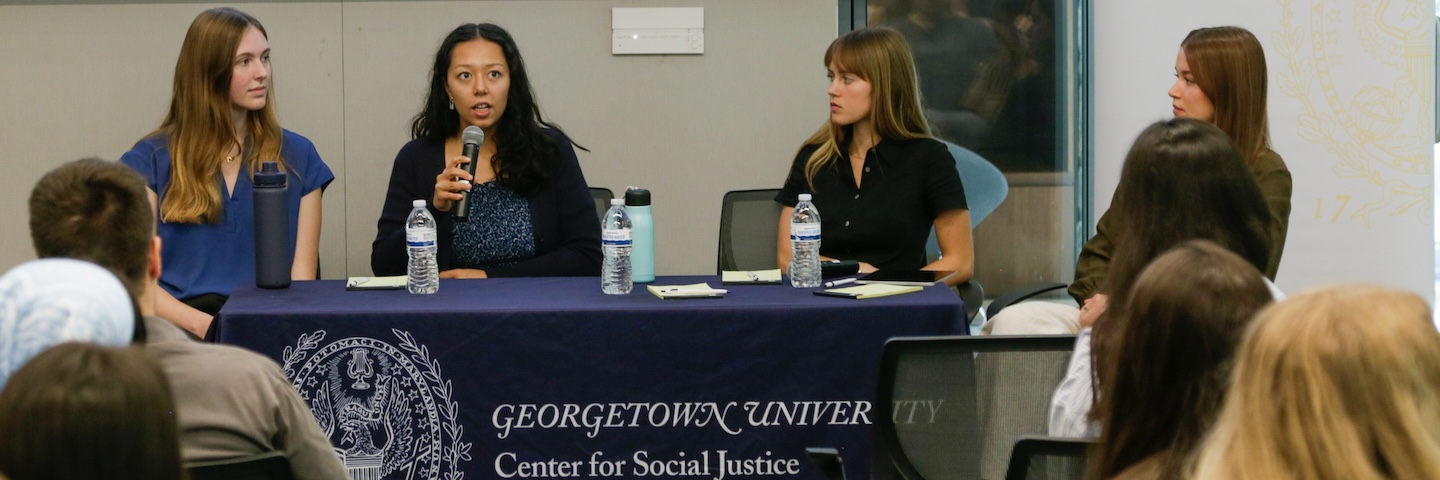
The Education and Social Justice Project (ESJ)—a joint initiative between the Berkley Center for Religion, Peace, and World Affairs; the Center for Social Justice Research, Teaching and Service (CSJ); and the Office of Mission & Ministry—has completed another year of awarding fellowships to a select group of students who conduct research at institutions across the world that support and promote social justice through education.
The 2025 ESJ fellows, Madison Ross (C’27), Allie Schlicht (SFS’27), Cici Sprouse (C’26), and Stella Vance (C’26), showcased their respective research projects at the "2025 Global Social Justice Research Symposium" on September 26. They were joined by fellows from the Laidlaw Undergraduate Leadership & Research Scholarship Program, Maeve McKean Global Health Award, David F. Andretta Summer Research Fellowship, and Royden B. Davis Fellowship.
This symposium was hosted by the CSJ and the Berkley Center at Georgetown University.
Academic and Personal Achievements through On-the-Ground Research
ESJ fellows embark on three-week long trips during the summer to Jesuit institutions around the world in order to learn more about a range of educational initiatives. This fully immersive, interdisciplinary approach to research gives students the opportunity to create impactful projects and meaningful memories.
By conducting interviews and recording their experiences onsite at their respective locations, the fellows engage deeply with the communities they are studying. Beyond their educational pursuits, the fellows make personal connections with the people they work with and understand the significance of the narratives they build together through the research process.
2025 ESJ Fellow Madison Ross (C’27) presented her project, Cultivating Personal Responsibility: A University Community’s Effort to Address Environmental Passivity, at the research symposium and shared the significance of her onsite presence:
I think, for me, it was important to be there in person…Even though they're not formally a part of my research, I had a lot of conversations with people on an informal basis.
Several of the fellows learned that building trust with the individuals they interviewed was a critical part of their research processes. Ross added, “Those conversations just did not come up in my formal questioning because I think it took that formal conversation for people to be willing to open up, which made being in person so much more vital to my research because it allowed me to actually understand where they were coming from, even if they didn’t want to say it on the record.”
2025 ESJ Fellow Cici Sprouse (C’26) also presented her research, titled The Power of Service Learning: How Do Students Perceive Volunteer Experiences at Loyola University in Seville, Spain, and noted the enthusiasm for her project among the community she studied:
I had over 30 people who initially filled out my survey to do these interviews…These people genuinely wanted to share about their community service experience, and that was, honestly, I think, also indicative of my findings–that it was very transformative to go through this community service experience.
Showcasing Research at Georgetown
The Global Social Justice Research Symposium takes place annually to allow students who completed a summer research project the chance to share their experiences and their findings throughout their respective programs. After leading their individual projects away from the Hilltop or Qatar campuses, the symposium serves as a gathering event to bring what they learned as well as their personal stories back to the Georgetown community.
Director of Engaged Scholarship and Pedagogy for CSJ Fatemeh Hosseini explained the significance of supporting students who go beyond the classroom.
The projects that we heard today remind us that research can also be about imagination, collaboration, and making a difference in our home communities. It was rewarding to see how the students’ projects bridge their classroom learning with the world beyond our campus.
The Global Social Justice Research Symposium featured student representatives from several summer programs. Some of the students were well seasoned in conducting research, while others shared that this was their first time participating in the process.
McKean Fellow Amara Saleem (SFS’25) noted that she was new to the process of research, after presenting her project on Barriers and Facilitators to Management of Gestational Diabetes Mellitus (GDM) Among Low-Income Populations in Karachi, Pakistan.
“Honestly, for me, there’s a lot of reasons why this research was really meaningful to me,” she reflected. “I think, on a scale of personal development, I came into this project not knowing anything about research, and going through the whole process with my mentors… has made me a better communicator, it’s made me more organized, and it has really informed my passion and excitement for working in global health. … It’s an opportunity that I’m really grateful for because it’s given me so much experience, building this project from the ground up.”
Minahil Mahmud (SFS’26), who is both a 2024 ESJ fellow and the 2025 David Andretta fellow, shared that she struggled with having confidence in the uniqueness of her leading ideas early on in the research process for her work entitled, The University and Everyday Resistance: Mapping Student Politics in Contemporary Pakistan. After collaborating with her mentors, however, she was able to push past her doubts. She said, “Through conversations with Dr. [Andria] Whistler and others, I realized that by doing this work myself, I am naturally bringing my own lens and my perspective and my positionality to this question.” One unexpected discovery was the passion Mahmud found for her project within the community she studied:
I was really pleasantly surprised through the course of my fieldwork this summer to find that people actually really did care about my topic… I thought I would have to convince people to speak to me, but I think we are all bound by certain shared values.
